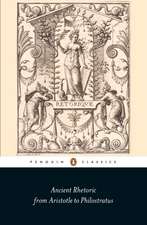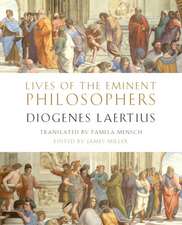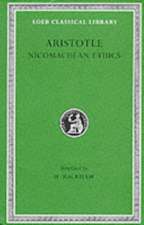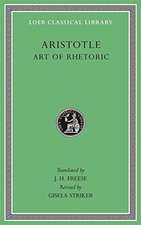Metaphysics: The New Hackett Aristotle
Autor Aristotle Traducere de C. D. C. Reeveen Limba Engleză Paperback – 29 feb 2016
| Toate formatele și edițiile | Preț | Express |
|---|---|---|
| Paperback (9) | 67.54 lei 3-5 săpt. | |
| CREATESPACE – | 67.54 lei 3-5 săpt. | |
| Penguin Books – 28 oct 1998 | 70.61 lei 24-35 zile | +27.31 lei 4-10 zile |
| CREATESPACE – | 73.46 lei 3-5 săpt. | |
| – | 87.12 lei 3-5 săpt. | |
| CreateSpace Independent Publishing Platform – 31 mar 2012 | 92.87 lei 3-5 săpt. | |
| Hackett Publishing Company – 31 dec 1984 | 106.61 lei 3-5 săpt. | +18.97 lei 4-10 zile |
| Prometheus Books – 31 mai 1991 | 117.68 lei 3-5 săpt. | +15.33 lei 4-10 zile |
| Hackett Publishing Company,Inc – 29 feb 2016 | 208.01 lei 3-5 săpt. | +66.28 lei 4-10 zile |
| COSIMO CLASSICS – 30 oct 2008 | 113.82 lei 6-8 săpt. | |
| Hardback (3) | 231.97 lei 6-8 săpt. | |
| Hackett Publishing Company – 31 dec 1984 | 292.22 lei 3-5 săpt. | |
| Hackett Publishing Company,Inc – mar 2016 | 544.76 lei 3-5 săpt. | |
| COSIMO CLASSICS – 30 oct 2008 | 231.97 lei 6-8 săpt. |
Preț: 208.01 lei
Preț vechi: 236.43 lei
-12% Nou
Puncte Express: 312
Preț estimativ în valută:
39.80€ • 41.56$ • 32.87£
39.80€ • 41.56$ • 32.87£
Carte disponibilă
Livrare economică 25 martie-08 aprilie
Livrare express 08-14 martie pentru 76.27 lei
Preluare comenzi: 021 569.72.76
Specificații
ISBN-13: 9781624664397
ISBN-10: 1624664393
Pagini: 688
Ilustrații: illustrations
Dimensiuni: 6 x 228 x 40 mm
Greutate: 0.86 kg
Editura: Hackett Publishing Company,Inc
Colecția Hackett Publishing Company, Inc (US)
Seria The New Hackett Aristotle
ISBN-10: 1624664393
Pagini: 688
Ilustrații: illustrations
Dimensiuni: 6 x 228 x 40 mm
Greutate: 0.86 kg
Editura: Hackett Publishing Company,Inc
Colecția Hackett Publishing Company, Inc (US)
Seria The New Hackett Aristotle
Recenzii
"C. D. C. Reeve adds to his already remarkable series of translations of Plato and Aristotle another stellar accomplishment: a full translation of Aristotle's daunting Metaphysics. He has managed to present Aristotle's often ungainly Greek into perfectly flowing English syntax without sacrificing the core meaning of the text. Any translator of Aristotle will recognize what an impressive achievement this is. All readers will benefit from the over 1,600 explicative notes accompanying the translation: Reeve has a discerning eye for determining what requires amplification for the purposes of understanding and an admirable gift for saying just as much as needs to be said in order to achieve it." Christopher Shields, George N. Shuster Professor of Philosophy, University of Notre Dame
Notă biografică
Aristotle (Greek: ¿¿¿¿¿¿¿¿¿¿¿ Aristotél¿s, pronounced [aristotél¿¿s]; 384-322 BC)[A] was a Greek philosopher and polymath during the Classical period in Ancient Greece. Taught by Plato, he was the founder of the Lyceum, the Peripatetic school of philosophy, and the Aristotelian tradition. His writings cover many subjects. including physics, biology, zoology, metaphysics, logic, ethics, estheticspoetry, theatre, music, rhetoric, psychology, linguistics, economics, politics, and government. Aristotle provided a complex synthesis of the various philosophies existing prior to him. It was above all from his teachings that the West inherited its intellectual lexicon, as well as problems and methods of inquiry. As a result, his philosophy has exerted a unique influence on almost every form of knowledge in the West and it continues to be a subject of contemporary philosophical discussion.
Little is known about his life. Aristotle was born in the city of Stagira in Northern Greece. His father, Nicomachus, died when Aristotle was a child, and he was brought up by a guardian. At seventeen or eighteen years of age he joined Plato's Academy in Athens and remained there until the age of thirty-seven (c. 347 BC).[4] Shortly after Plato died, Aristotle left Athens and, at the request of Philip II of Macedon, tutored Alexander the Great beginning in 343 BC.[5] He established a library in the Lyceum which helped him to produce many of his hundreds of books on papyrus scrolls. Though Aristotle wrote many elegant treatises and dialogues for publication, only around a third of his original output has survived, none of it intended for publication.[6]
Aristotle's views on physical science profoundly shaped medieval scholarship. Their influence extended from Late Antiquity and the Early Middle Ages into the Renaissance, and were not replaced systematically until the Enlightenment and theories such as classical mechanics. Some of Aristotle's zoological observations found in his biology, such as on the hectocotyl (reproductive) arm of the octopus, were disbelieved until the 19th century. His works contain the earliest known formal study of logic, studied by medieval scholars such as Peter Abelard and John Buridan. Aristotle's influence on logic also continued well into the 19th century.
He influenced Islamic thought during the Middle Ages, as well as Christian theology, especially the Neoplatonism of the Early Church and the scholastic tradition of the Catholic Church. Aristotle was revered among medieval Muslim scholars as "The First Teacher" and among medieval Christians like Thomas Aquinas as simply "The Philosopher". His ethics, though always influential, gained renewed interest with the modern advent of virtue ethics, such as in the thinking of Alasdair MacIntyre and Philippa Foot.
Cuprins
The Metaphysics - Aristotle Translated with an Introduction by Hugh Lawson-Tancred
Preface
Introduction
THE METAPHYSICSBook Alpha
Book Alpha the Lesser
Book Beta
Book Gamma
Book Delta
Book Epsilon
Book Zeta
Book Eta
Book Theta
Book Iota
Book Kappa
Book Lambda
Book Mu
Book Nu
Bibliography





































